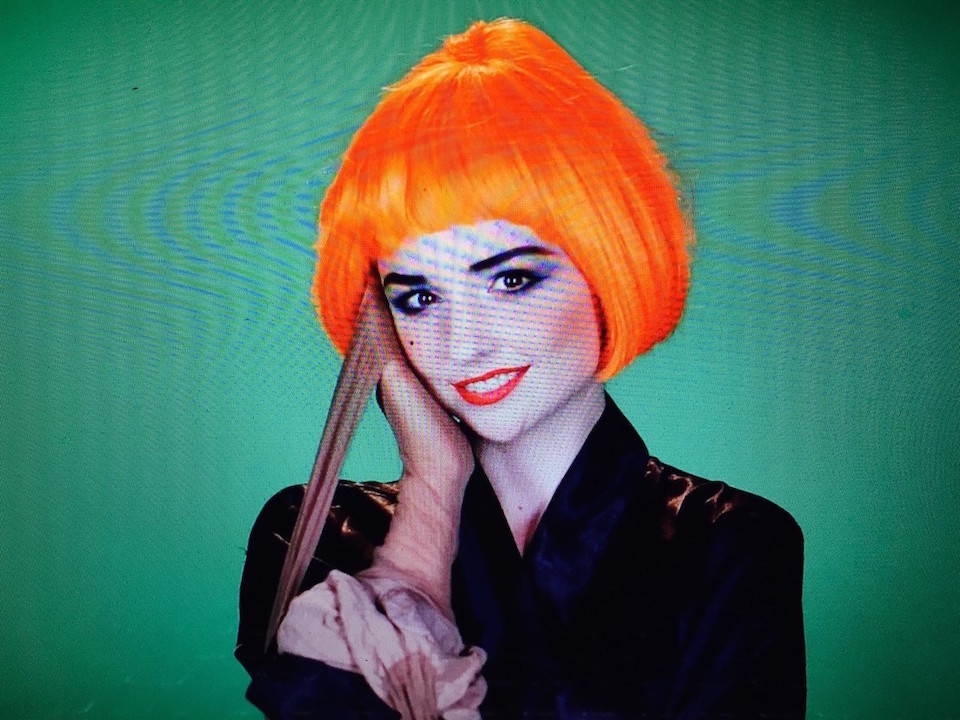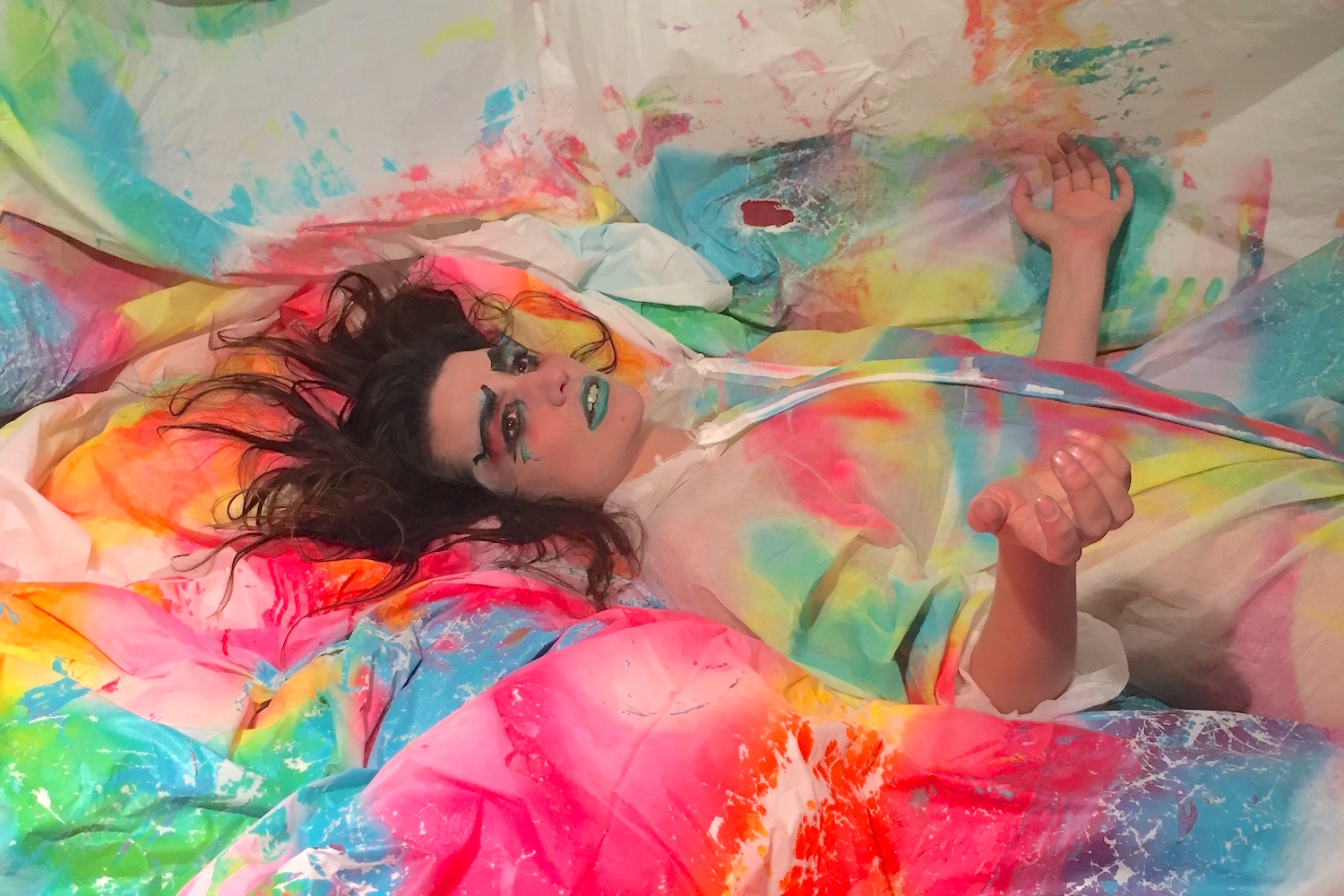Photo ELAINE CAREY HASWELL
Words PETER HOLSLIN
…it is sometimes an appropriate response to reality to go insane.
—Philip K. Dick
The city ripples across the landscape, the sun glowing merrily through the smog. It’s early afternoon in Los Angeles, and the rush hour traffic has just begun to swell—a daily rabble that sends cars seeping through the city like chemical compounds through veins. But Geneva Jacuzzi is away from all that. She’s sitting at a dining table in her Glassell Park apartment, chatting with her manager while typing away at her ancient, bruised Macbook.
Jacuzzi’s cockatiel, Norman, squeaks a greeting from his cage. Her manager, a physically fit ex-Navy officer named Adam Schuman, sucks soda from a Burger King cup. Jacuzzi—real name Geneva Garvin—is tending to business affairs. The songwriter/performance artist recently went through a crazy period in her life; it was a time filled with lots of creativity, but also lots of drugs, and it culminated in her finishing her new album, Technophelia, and then checking into a 30-day rehab program the next day. Today, she’s finally tackling some things she’s been putting off, including a backlog of merch orders that some customers had put in as long as a year ago.
Jacuzzi, 34, is a key figure in L.A.’s underground art and music scene. A weirdo to the core, she commands a cult following thanks to her ’80s-style goth-pop tunes and phantasmagoric live shows. In a city full of celebs, Jacuzzi might just be one of them, albeit on an underground level. Yet she possesses a healthy skepticism about the myths and assumptions that feed into the pop culture industry—and that help create what you and I might call “reality.”
“I’m always eternally confused as to why I’m not moved by a lot of music that’s coming out today,” says Jacuzzi. “I feel like there’s some artificial ingredient that’s being put into this process.” She walks over to the staircase in her apartment, sits down, and continues, “In the past, people always assumed that there was some unknown force that creates the music—god, or some spirit, or some magic, or some ancient wisdom. It’s a very mystical process of making music. But now it’s like, people are inspired by something that has nothing to do with it. Like Pitchfork. Social media…. What happens when you synthesize?”
Questions of human consciousness and understanding have always lingered in the minds of philosophers. These days this discourse has taken on a new tenor in pop music, along with the rise of a vast array of electronic tools and networks. A wide range of artists, from Ariel Pink to Oneohtrix Point Never to Anamanaguchi, have been rummaging through the cultural junkyards of our past, embracing VHS warp, video game pixellation, and all sorts of other kitschy ephemera to devise new inspiration and understanding. Other artists, meanwhile, have thrown the rules out altogether, radically or even violently reshaping the boundaries of who you can be and what you can do, just as Venezuelan electronic producer Arca does on his shape-shifting 2015 album, Mutant.
Musically, Jacuzzi has a firm grip on familiar sounds. Technophelia, which she made with the help of record producer Chris Coady (Yeah Yeah Yeahs, TV On the Radio, Beach House), is straight-up ’80s-style goth-pop. It’s moody but catchy, with album highlight “Cannibal Babies” taking off on a kooky synthesizer groove while Jacuzzi murmurs and yelps like a young Siouxsie Sioux. However, don’t be mistaken. The deeper you delve into Jacuzzi’s world, the weirder it gets.
One of Jacuzzi’s biggest influences is Philip K. Dick, the prolific science-fiction author who, in landmark books like VALIS and Do Androids Dream of Electric Sheep?, offered up unsettling visions of the future. His characters were marooned on Martian colonies, addicted to consciousness-altering drugs, and caught within maze-like dimensions. They struggled to make sense of their surroundings, and of themselves.
Dick, who dealt with mental health issues and drug use himself before passing away in 1982, filled his books with ideas as well as literary references, quirky jokes and world-building slang terms—and Jacuzzi brings a similar, off-planet provocativeness to her work. Just consider an infomercial she made in 2014 for a product called “MoCA Lotion.” Commissioned by L.A.’s Museum of Contemporary Art, the satiric video advertises items like “memory lozenges,” “anti-bitch cream” and a corrosive “acid wash” that strips the skin off your face.
“It’s actually a very horrifying, terrifying product,” explains Jacuzzi, who’s wearing purple tights, a button-up blouse, intricately-patterned leather shoes, and a floppy leather cap that looks like it came out of an Italian renaissance painter’s wardrobe. “It’s like auto-cannibalism. You’re consuming yourself through these products, you know what I mean? These holes get ripped from you and you can purchase them with products and fill them back in. But it’s basically your own void. You’re basically consuming yourself. You’re buying yourself through products.”
Jacuzzi is open and easygoing, with lively brown eyes and a talkative nature. She has a way of saying deep, creative things almost offhand, which helps explain her allure. Over the years, she’s performed in 31 countries, including far-off locales like Colombia and Russia.
“She’s magnetic,” says Elaine Carey, Jacuzzi’s roommate and friend, who plays in L.A. experimental duo Telecaves. “She has this warmth and this positive energy that’s really attractive. I think that she’s very ambitious and wants to incorporate all of her interests and the ideas that fascinate her into her creative output, which is something that I don’t think most artists do. She’s an auteur, you know? Most artists say, ‘OK, well this is the thing that I’m expressing with what I’m doing,’ and Geneva wants it to be more than that. She wants it to be complex and incorporate everything that’s going on in her life into each performance or each thing that she does.”

Granted, Jacuzzi’s songs and performances are so laden with symbolism and myth that they don’t always make sense, at least not right away. That’s certainly the case with Moca Lotion. In a document of “freestyle writings” she sent self-titled, she laid out a dizzying dialectic, musing on the project as a “crystallized immortalized crypt for a projected self,” raising the idea that the Jacuzzi concept exists only insofar as it’s mediated through the internet and onstage. In another section, she describes a person dropping fish food into the tank of a long-dead pet, calling it a “feedback loop of unmournable loss” mediated by consumerism. If you feel lost, maybe that’s kind of the point. Moca Lotion is inspired by the ubiquitous can of aerosol spray that keeps popping up in Dick’s 1969 novel Ubik. It’s the book’s single thread of consistency, a stand-in for god and faith amid a reality-blurring caper through temporal dimensions.
Jacuzzi’s own life has had a rather P.K.D.-esque trajectory. Raised in Southern California, her parents raised her as a devout Jehovah’s Witness. Going door to door to preach the word of God, she was taught early on that the world would soon reach Armageddon, and that she’d end up as one of God’s chosen people, walking the Earth as a physical being for all eternity.
“I believed that I was immortal, for fuck’s sake, up until I was 18 years old,” she recalls.
Jacuzzi says the Witnesses reinforce their belief system through isolation and intimidation; she never celebrated holidays and birthdays, and the church was always eager to crack down on “sin” and cast out doubters as “apostates.” So it wasn’t until she left the house and moved to L.A., where she began making music and going to Goth clubs, that Jacuzzi was finally able to open her eyes.
Still, that didn’t make her any more trusting of the world outside.
“I was a normal, intelligent person,” explains Jacuzzi. “My family that is Jehovah’s Witness are intelligent people. But they believed this. Literally. Like it’s real. And I believed it like it was real. So when all of a sudden that became unreal, OK, that’s a shock to the system. But what came from it was I could see how a lot of the things that were real on the other side were not that much different. The way people believe things—we kind of just take things for face value. We sort of believe what we’re told.
“So when I approach making music,” she adds, “I can’t just do what I’m supposed to do. I’m always just like, Nothing ever makes sense. It’s like an existential crisis around every recording.”
The world Jacuzzi lives in today is simultaneously more beautiful and more disturbing than any of the futures Dick envisioned in his novels. Public discourse is easily manipulated and digested. Identities and personal relationships are mediated by the billion-dollar corporations that own our “social networks.” All-powerful pharmaceutical companies and drug cartels feed people mind-altering herbs and chemicals, which can just as easily enhance our creative juices as strip us of our hopes and dreams and leave us as empty shells.
Through her own life experience, Jacuzzi has been able to navigate all this and ground herself. Indeed, one of the most refreshing things about her is her total ambivalence towards doing things in any “conventional” way. She built and manages her website using a long-outdated Apple program called iWeb. She refuses to have a live band and prefers instead to put on elaborate, DIY productions of audio-visual performance art. Several years ago, when she received an email from a writer at Pitchfork—essentially the New York Times of the indie music world, a site that plenty of musicians would be stoked to get attention from—she simply ignored it.
Coady, the producer who worked on Technophelia, tells self-titled that he was also initially rebuffed when he reached out to Jacuzzi a few years ago. When they finally did get together to collaborate on the new record, he says it was clear that Jacuzzi had her own vision in mind.
“She was really good to work with because she knows exactly what she wants,” says Coady.
Still, completing the album was a struggle for Jacuzzi. As she toiled away at its 13 songs, she found herself overwhelmed by the emotions and memories embedded in each one. She says the songs were like their own individual time capsules, drawing from a deep well of personal experience, and as she got closer to finishing Jacuzzi found herself paralyzed by self-doubt, terrified of releasing the album to the world.
“Everyone—every single person that works on something and works on it really hard—is afraid to present it to the world, is afraid to finish it, is afraid to let it go,” she says. “I was like, ‘Do I like this? Is this good? Is this me?’ I’ve been through so many transitions. I had a weird life where I never stopped and figured that out. I’ve had a really crazy life, you know? And [I] never had to stop and really deal with it because when it got too bad I’d just drink, or use, or go on tour, or fall in love, or just something.
“Having all these songs come up was literally like—it just was like walking through a horror movie, almost, of your life. With a soundtrack,” she adds with a laugh.
Now, post-recovery, with her new album out, she sees Technophelia with a sense of clarity: This is her, after all.
At this point we can probably all agree that the world is full of lies. Simulacra and artifice runs deep, especially in an entertainment hub like Los Angeles. People reinvent themselves all the time, or portray versions of themselves online. But in a fundamental way, building yourself up, building your career and your friends and even your online persona, is just a necessary part of life. Of course, disillusionment can set in. Vision shifts. Anxiety rises. Reality blurs with “reality.” But Jacuzzi’s art just goes to show that even when the ground itself begins to feel shaky, and you start to question everything, there is still truth to be explored.
“I love playing with myth, because I’m always constantly trying to rewrite the myth of my own past,” Jacuzzi says. “There’s a broken code in there somewhere. I gotta fix it.”
‘Technophelia’ is now available through Medical Records. For a closer look at some of Jacuzzi’s influences, check out the exclusive mix she made for us below.
Tracklisting:
1. Imagination – “Body Talk”
2. Will Powers – “Adventures in Success”
3. Stanton Miranda – “Wheels Over Indian Trails”
4. Cabaret Voltaire – “Here To Go”
5. Damon Edge – “Blue Nights”
6. Gina and the Flexix – “I Wanna Believe”





